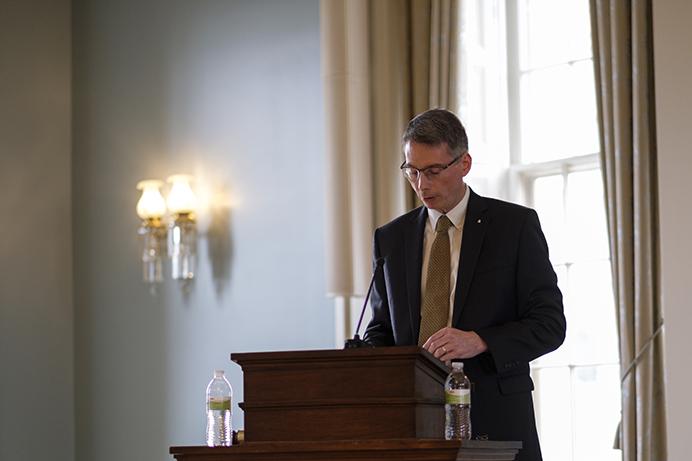Faculty choose new leaders for next year
Incoming President of the Faculty Senate Peter Snyder adresses the Senate on April 25, 2017. Snyder, a cardiology prefessor, will serve as Senate president for the 2017-18 academic year. (The Daily Iowan/Nick Rohlman)
April 26, 2017
The lame-duck period began for the 2016-2017 University of Iowa Faculty Senate officers Tuesday.
Faculty Senate members elected a new group of officers for the coming school year at their last meeting of the semester in the of the Old Capitol Senate Chamber on Tuesday.
Current Faculty Senate Vice President Peter Snyder, a professor of cardiology, will be at the helm of the organization as president in the next academic year. He said he is humbled to serve as the Faculty Senate president.
“I can think of no more impactful way for me to serve the University of Iowa,” he said.
Outgoing Faculty Senate President Tom Vaughn, an associate professor of public health, will replace Ed Dove, an associate professor of biomedical engineering, to serve as the past president, another positon.
Some of the major obstacles these faculty leaders have addressed while serving in their current positions include lifting the sanction the American Association of University Professors placed on the UI after the hiring of UI President Bruce Harreld, handling the new process of submitting strategic initiatives, undergoing the academic organizational structure study, and working with the administration’s new approach to budgeting.
Vaughn expressed confidence in Snyder and the newly elected officers. Vaughn said something he wishes he could have done while in office is find more ways to encourage faculty communication.
“We can only be a community reaching our full potential as a university if we continue to strive to reach our full potential in shared governance,” Vaughn said.
The incoming officers highlighted shared governance as a priority of theirs in serving as Faculty Senate officers.
Snyder said he didn’t fully appreciate shared governance until becoming a Faculty Senate officer.
“You have a seat at the table to express what is important to us — our values — and also to express our concerns,” he said. “It doesn’t mean we get to make the final decisions; that rests with the president and the Board of Regents …”
Additionally, Snyder said, shared governance means shared responsibility and being willing to engage with Harreld and other administrators to work collaboratively.
“If we don’t do this, we give up our seat at the table and the ability to influence the direction of the university,” he said.
Rachel Williams, the head of the Gender, Women’s, and Sexuality Studies Department, will replace Ed Gillan, an associate professor of chemistry, as Faculty Senate secretary. She said she supports transparency, open dialogue, and collaboration with other shared governance leaders — Student Government, Staff Council, university administration, and the regents — in facing the challenges ahead of faculty.
“We face great challenges in this time of diminishing resources, leadership transitions, and expanding demands on faculty and staff,” she said in a statement distributed to the meeting’s attendees.
Serving as vice president will be Russ Ganim, a professor of French and the director of the Division of World Languages, Literatures, and Cultures. He said his dual roles as an administrator and faculty member position him uniquely to advocate for faculty and collaborate with people across the university.
“Faculty input and shared governance are the cornerstones of all academic institutions,” he said in a statement distributed to the meeting’s attendees. “The values of collegiality, transparency, and professionalism are essential to maintaining our identity as a university when facing the challenges ahead of us.”
Work to address the university’s challenges will begin over the summer, Snyder said.
“We need to find new ways to reach out to citizens of our state and our nation to reinforce the value of higher education in a public way,” he said.



